Photographs: Amit Dave/Reuters Sheela Bhatt in New Delhi
'In the early 2000s, mid-2000s, one of the big changes in India was the sense that India was finally going to make it. With all its flaws and faults, the relatively high growth rate gave you an opportunity to do other things and so forth. Right now, there is nervousness about whether India can actually make it.'
The second part of political thinker Pratap Bhanu Mehta's eloquent interview to Rediff.com's Sheela Bhatt.
Part 1: 'Modi is trying to create national legitimacy on his persona alone'
I understand it is a difficult exercise, but if you are asked to take a photograph or freeze the moment, as of today, of the mood of the nation, how would you describe it?
One of the things I always say is that anybody who claims to say what public opinion is probably a charlatan in some respects. But I do think there is now an undercurrent of anxiety.
I think somewhere in the early 2000s, mid-2000s, one of the big changes in India was the sense that India was finally going to make it.
With all its flaws and faults, the relatively high growth rate gave you an opportunity to do other things and so forth. Right now, there is nervousness about whether India can actually make it.
That confidence we had, 4, 5 years ago, where we knew there will be ups and downs, but by and large we thought we have broken into a quantitatively new orbit -- in terms of how rich and prosperous India can be.
I think there is a lot of confusion about how that anxiety will manifest. There were snippets of it in the protest politics we saw a couple of years ago, which has spawned a phenomenon like Arvind Kejriwal. But that anxiety hasn't yet found a clear political expression that can address its concerns. And that’s where there is a lot of confusion.
Is Narendra Modi's visible rise more because of his skillful marketing his record or is it mainly because of the Manmohan Singh government's failure?
I would say it is primarily due to the government. But that is how politics actually works. Politics is about comparative advantage.
He has been very skillful at exploiting it. But it is the vacuum created by the Congress that has created an opportunity for Modi.
Kindly ...
'Rahul's attempt to distance himself from the government has completely backfired'
Image: 'Rahul Gandhi has not been able to address any of the national crises in the last 2, 3 years,' says Pratap Bhanu Mehta.Sheela Bhatt
A lot has been written about the speeches Congress Vice-President Rahul Gandhi makes. If you observe what Rahul Gandhi and his team are doing, do you find them and the Congress party on the right track to take on Modi?
The Congress's electoral strategy is completely mystifying to most of us. Why is it mystifying?
Frankly, Rahul Gandhi is not generating the kind of support and excitement that he should. In fact, there is a lot of disillusionment. There was a sense in 2009 that he would promise something new.
And it is fundamentally for three reasons. One, he is trying to put on this act that he is an outsider to the system and not responsible for the failures of the UPA (United Progressive Alliance) government. And that simply doesn't wash.
The fact of the matter is that he is one of the most powerful politicians in the UPA and this attempt to distance party and the government has completely backfired.
The second reason has to do with his persona. Politics is a full-time job. There have been lots and lots of national crises in the last 2, 3 years and it is not clear that Rahul Gandhi has been, in a sense, able to address any of those.
What do people want from politicians? They want them to show how they are addressing their anxieties. He has been almost missing from action.
When he does come into action -- and frankly I think this ordinance thing was a good example -- even if you argue that he did the right thing, the way he did it actually ended up backfiring. Because you know there were better ways of doing it.
You could have done it in Parliament. You could have simply stopped your government from bringing in this ordinance. But what he did amounted to nothing but a public humiliation of Prime Minister Manmohan Singh.
At some level people started saying that if you can do that to Dr Singh who has been loyal to you, and you did it needlessly because you could have achieved the objective any way, are you really that trustworthy?
I think the third element of Rahul Gandhi is a retreat to his family history, particularly, in the last few speeches where he talks about the martyrdom of Indira Gandhi, Rajiv Gandhi etc.
At one level those are great personal tragedies and important historical facts. But the fact of the matter is that right now there is an institutional crisis, and this is what a lot of people are feeling.
One of the things that the UPA has produced is a systematic crisis in institutions, whether it is Parliament, whether it is the CBI (Central Bureau of Investigation), whether it is the justice system across the board.
In that context, Indira Gandhi and Rajiv Gandhi are not good examples to invoke. In fact, I am surprised to see how little he talks about Jawaharlal Nehru. You would have thought claiming Nehru's legacy would be a much better example.
Is it your observation that Sonia Gandhi is in retreat mode?
Honestly, I don't know. I have no information about her health.
My question is about the transfer of power that is taking place in the Congress party. Do you find that?
The Congress is a strange party that way. It is not an institution where you actually, formally, do so. When we say that transfer of power has taken place, usually, that means you have transferred the power to somebody and then you just let them get on with it.
The Congress is strange in the sense that even when it does it, it is always open to the head of the family to come and retrieve things. So, there is clearly a sense that, yes, Rahul is going to take a bigger role and he is now in a sense the visible face of both the family and the party.
But in a sense that doesn't preclude Sonia Gandhi actually exercising influence as and when she thinks fit.
Frankly, I think, in the last Parliament session, you know if you think about something like the Food Security Bill, which was Sonia's pet project when she decided to do it, the job wasn't delegated. It was arranged that it will be done.
So, it is a very peculiar kind of Congress delegation of power where, yes, obviously, they are preparing the next generation, but in a sense Sonia's shadow will still continue to be influential.
Kindly ...
'BJP's success will have profound influence on regional parties' fortunes'
Image: 'If the BJP does well in UP it has huge significance for the Bahujan Samaj Party and the Samajwadi Party,' says Bhanu Pratap Mehta.Samajwadi Party leader Mulayam Singh Yadav, who is unlikely to align with the BJP, left. BSP leader Mayawati, who has aligned with the BJP earlier, right.Sheela Bhatt
Do you think Sonia Gandhi will look back with satisfaction at the last ten years?
These are personal psychological questions. To be fair to her, in her own mind, there is a story about what the UPA did which is a source of some satisfaction. And that narrative centres on the creation of a welfare State.
The UPA laid the foundations for a widespread massive welfare State, if you look at the range of rights and legislation.
Now whether that is a right conception is a different matter, but I think I would suspect she could take some satisfaction from that story. And that is the story they are trying to project.
Is it correct to say that in UPA-2, Prime Minister Manmohan Singh's leadership has failed? And if it is so, what failed him?
To me, it is not a very important question whether Manmohan Singh's leadership failed. The point is that there was a system the Congress had created with whatever this division of power was supposed to be. And that system simply did not work in UPA-2.
Certainly, the prime minister's office is a much diminished office with the PM's writ pretty much not running on anything.
Now whether it is because he did not exercise power and leveraged his relationship with Sonia Gandhi to get things done or, did Sonia Gandhi actually give him a more of a free hand?
He could have done things or whether he was not allowed to do things, frankly that is immaterial. But the fact of the matter is that the arrangement collapsed between them.
How do you see this recent meeting of 14 regional parties? Do you see any third alternative emerging?
How do you see the entire picture of regional parties? When one goes out of New Delhi, you know their presence is immense.
The regional parties are going to remain significant forces. I suspect this election may surprise you. You may see more consolidation of the national parties.
But the fact of the matter is that even in the best case scenario, whichever way it goes, regional parties, smaller parties, will have close to 230, 240 seats, so there is just no denying the fact that they are going to be a very large presence.
The regional parties also realise one thing, which is, if Modi succeeds in getting the BJP 185 plus, it is going to change the rules of Indian politics.
The regional parties also have the sense that the electoral strategy that the BJP is using is not so much about secularism versus communalism.
If the BJP's electoral strategy succeeds, it will have profound influence on the regional parties's fortunes four to five years from now.
(Janata Dal-United leader and Bihar Chief Minister) Nitish Kumar knows that if the BJP does well, it has huge significance.
If the BJP does well in Uttar Pradesh it has huge significance for the Bahujan Samaj Party and the Samajwadi Party.
So at one level, the BJP's success is not simply that they are winning an election, you might actually be rewriting the rules of Indian politics.
I think that is what they (the regional parties) are apprehensive about.
Kindly ...
'Muslims want to break out of the Congress-BJP system straitjacket'
Image: A Muslim leader greets Narendra Modi during his 72-hour Sadbhavana Mission fast in Ahmedabad in September 2012.Sheela Bhatt
Do you think that a certain India is afraid of Modi?
See, with any leader like Modi, there are reasons to be afraid of.
By and large, India has been a consensual political structure, even when it has strong leadership. And there has been a narrative about India that the only way you can actually hold India together is by a kind of politics of consensus.
There is a line somebody once wrote about Tulsidas which said, 'Bharat ka loknaik woh he ho sakta hai joh samanvay kar sake (Only that person who synthesises can actually become the leader of people of India.)'
Modi's politics is not yet -- at least he hasn't shown evidence -- building that kind of consensus. So he may evolve into that.
In that sense, the one source of fear is that this is just a very different kind of creature from anything that we have known so far in Indian politics.
I mean Modi has been trying to project a new image, but again as Machiavelli said, 'Do you trust people who are liberal or who choose to be liberal?'
People have questions about that. There is no denying that political fact. And the fact that he will create a completely new basis of legitimacy in Indian politics which is centered around his own personal political trajectory provokes anxiety in a lot of people's minds -- what it actually means for Indian politics?
Are the Muslims of India, the Muslim voters of India, passively protesting against him or actively protesting his political rise?
Frankly, it is very hard for any of us to pretend to understand the choices Muslim voters face.
They have been stuck between a rock and a hard place where they have been used by the so-called secular parties, including parties like the Congress and the SP (Samajwadi Party) without those parties creating the conditions for their full participation in Indian politics.
We know Muslim representation in the Congress also tends to be very low. And in some sense I think the secular parties have kind of thrived on keeping Muslims in the margins.
The threat of the BJP has actually helped exacerbate that, the idea of threat.
My sense is that a lot of Muslims want to break out of this straitjacket; they don't want to feel trapped in this.
There are a couple of Muslim leaders who have said to the Congress that 'Look, you can't just blackmail us. That it is basically almost kind of keeping us beholden to you in perpetuity without actually doing much for us.' So that is one kind of response.
There is another kind of response where Muslim groups are actually setting up small parties of their own; in Bengal, in Assam, having strategic alliances, there is a call actually for a Muslim party.
So I think Muslims want to break out of this straitjacket with this -- let us call it the Congress-BJP system as it goes on, and these are like Tweedledum and Tweedledee. They feed off each other.
But how you actually graft political choices that allow you to do something is a difficult question.
By the way, this is not just a difficult question for Muslims. I mean most of us as voters feel that way too.
(Arvind) Kejriwal is a new phenomenon in Delhi, but the fact of the matter is creating a new political alternative kind of politics that can break out of this paradigm is a difficult thing for all Indian voters.
There is an added burden on the Muslims. So how it will politically express itself is going to be a very difficult question.
You have seen how in the five-state assembly elections, the Congress was struggling. Can the Congress retrieve the situation? Does it have the strength to fight back?
The Congress does have... it has genuine national presence in some ways. The BJP is at most competitive in about 280 seats. And it has to peak in very large proportions of them.
Amongst the Dalits and the poor, the Congress still has a little bit or more of an advantage. Not so much amongst the Scheduled Tribes now. The BJP still has to work harder to make inroads into poor and Dalit voters.
I think Sonia Gandhi still does command a degree of national respect. Again you may argue not because of any spectacular achievements, but it is again a comparative judgment. Given how diminished almost all other politicians look.
And the Congress still does have the machinery of the State behind it. Let us not underestimate the importance of that machinery.
So it has few elements and it could still mount a fight. The question is whether it has the clarity to do it.
Kindly ...
'Modi has to show how he will build more credible institutions'
Image: 'Narendra Modi is trying to project a new narrative, but what about the BJP on the ground?' asks Pratap Bhanu Mehta.Photographs: Courtesy: Gujarat BJP Sheela Bhatt
We have seen American campaigns, many European campaigns. Compared to these campaigns, what are the weaknesses of Narendra Modi's campaign?
I don't think it is fair to compare American campaigns to ours. It is a very different political system. I would say there are two core issues that the Modi campaign still has to address fully.
The first issue is about his trustworthiness in the ideals of secularism. He has been trying to articulate a new discourse and trying to say that he wants to move beyond Hindu-Muslim politics, to a stage where these categories become less relevant to public policy.
On the other hand, if at the same time you are doing shahid-yatras in Bihar and so forth after the recent bomb blasts in Patna, there is a sense that he is still playing both sides of the gallery and he has to be much more convincing on that.
I think the second question we need to ask is -- he is trying to project a new narrative, but what about the BJP on the ground?
Is the UP (Uttar Pradesh) BJP now any different from what it was 20 years ago?
Will this be the politics of aspiration that he is talking about? You don't quite see the change in the daily operations of the BJP. The party doesn't seem to be able to project that.
So is he just kind of floating above there with his kind of extraordinary public relations exercise, whereas the party structure still looks pretty old, still looks pretty familiar?
Also, he has to show how he will be able to build more credible institutions. It is actually related to the point about secularism because it is not about what he says, but it is about whether you graft an institutional framework or not.
Because ultimately the assurance people need is not that I am at the mercy of one leader against another, but an assurance that the system functions for me.
You know Achyut Yagnik, one of Ahmedabad's best analysts, reminds me frequently that India is not Gujarat. He explains that the Gujarati middle class supported Modi, but the Indian middle class will not because the composition of the Gujarati middle class is more baniya-ish (mercantile oriented). The Indian middle class is not so.
The non-Gujarati Indian middle class's thinking and approach to Modi will be different. And that is why he says, 'Jaise Emergency mein unpadh logon ne padhe hue logon ko bachaya tha (illiterate voters saved the literate classes) by throwing out Indira Gandhi from power, the same thing will happen now.
The Indian poor will not allow Modi to come to power.
To be honest, I am a little bit sceptical of these kinds of discourses. I mean the old categories of baniya and so forth. Frankly, the composition of the middle class elsewhere has also changed.
There are a lot of first time entrants into this new middle class who actually want a new story of striving. It is not that there is a kind of old...
My straight question -- is India like Gujarat? Will Indians respond differently to Modi than the way Gujaratis have responded?
But that is true by definition. India is not a Tamil Nadu also. India is not a Madhya Pradesh. It cannot be.
I am asking with reference to Modi.
No. India is not Gujarat. Absolutely right. And certainly Gujarat politics has a social dynamics. That cannot be replicated elsewhere, easily. That proposition is absolutely correct.
But in a sense Modi is not playing that politics here (in India, outside Gujarat).
I think Professor Suhas Palshikar wrote a very insightful article... You might not actually get one Modi, you might actually get five Modis.
In Maharashtra there is a narrative, in UP there is a narrative. And so the issue is how successful can he be in adopting the personas that fits in these different narratives? And that is what he has been trying.
Kindly ...
'If the NDA wins, it certainly will be an anti-incumbency vote'
Image: Prime Minister Manmohan Singh and Congress President Sonia Gandhi.Photographs: B Mathur/Reuters Sheela Bhatt
If elections are held today and if at all the NDA (National Democratic Alliance) makes it under Modi's leadership, what kind of ideas will be crystallised through the NDA rule?
The one thing I have learnt about Indian politics is that you will be constantly surprised at what policies governments enact. Think of the NDA. It would have been difficult to believe if somebody had told me in 1998-1999 that Jaswant Singh and Yashwant Sinha as finance ministers would do what they did, pass this self-restraining Fiscal Responsibility Budget Management Act that you actually don't even expect politicians to do.
So I suspect there will be a lot of improvisation, particularly on the economic side. I am not one of those people who buy that there is actually kind of a straight narrative.
I think the composition of the NDA is certainly going to be important. There will be more constraints compared to NDA-I.
Will the 2014 vote be an anti-UPA vote or a pro-NDA vote?
If the NDA gets it, there will certainly be an anti-incumbency vote. That will be the driver. It will be up to them to convert it to something positive.
If the election is held today, do you think the BJP under Modi's leadership will get 200 seats. What is your guess?
I do believe in the Sufi saying, and it is specially true about political scientists -- those of us who speak about the future, lie even when they speak the truth. I honestly don't know.
Is he on a winning streak?
I honestly don't know. He is gaining momentum rapidly.
Whether it is enough to get him over 185 or 200 seats I am not sure, yet, but, he is definitely gaining.

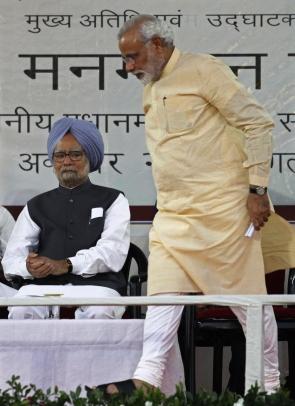
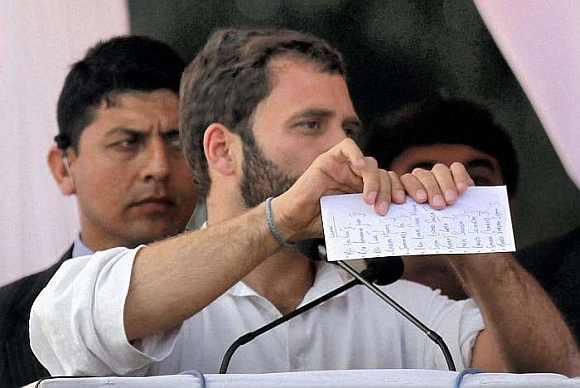
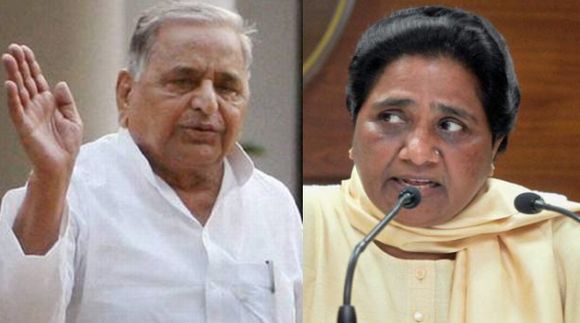
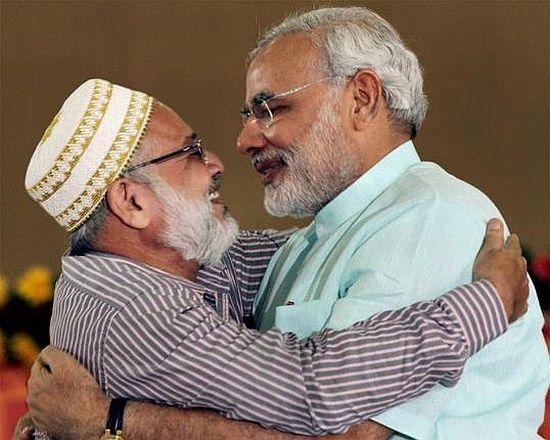
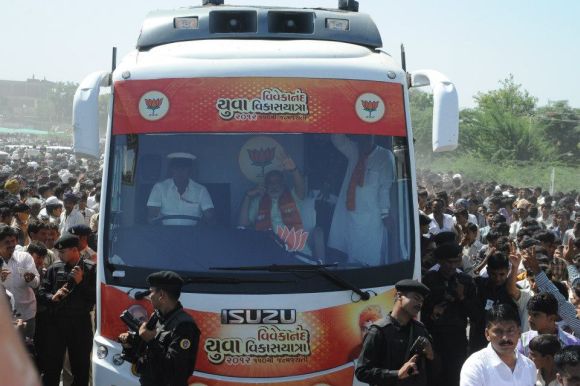
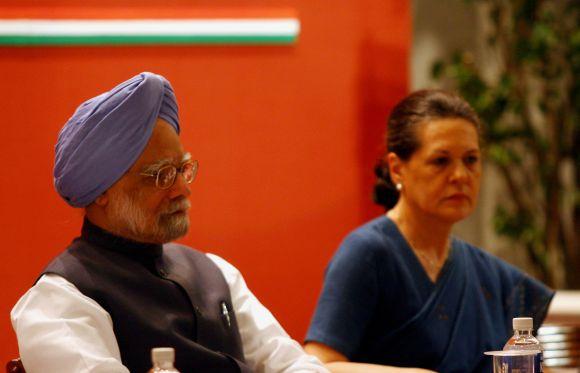
article